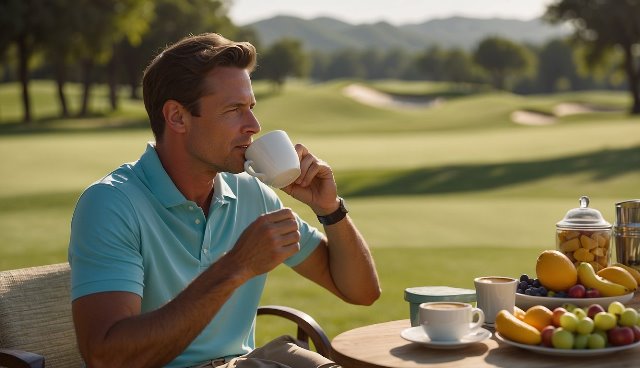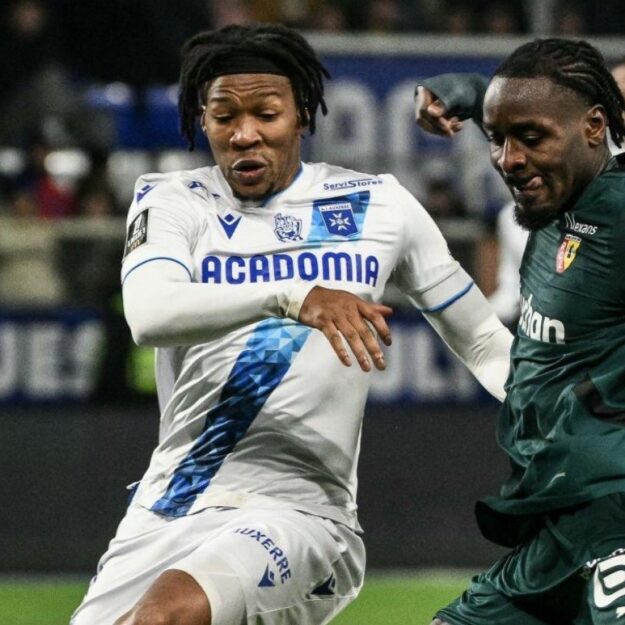
Studies show that golfers who had caffeine drove the ball farther than those who didn’t.
Coffee gives you a mental and physical edge for golf. The caffeine wakes up your brain and body, helping you focus better and swing with more power. It can also fight off tiredness during long rounds.
But be careful not to overdo it. Too much coffee could make you jittery and mess up your shots.
Some pro golfers swear by coffee to up their game. Phil Mickelson even created his own coffee blend with ingredients meant to help on the course. While it’s not a magic potion, a cup of joe could give you that extra boost to shave a few strokes off your score.
The Influence of Coffee on Golfer’s Performance
Coffee can affect how golfers play. It gives energy and helps focus, but too much might cause problems.
Energy Boost and Endurance
Coffee gives golfers a quick energy boost. Whether playing at a Golf Course in the UK or on a Golf Holiday in Mauritius. The caffeine in coffee wakes you up and makes you feel less tired. This can help you play better for longer.
Drinking coffee before a round might help you walk the course without getting worn out. It can also keep you alert during long games.
But be careful not to drink too much. Too much coffee can make you jittery or anxious, which could hurt your swing or putting.
Caffeine’s Effect on Focus and Concentration
Coffee can sharpen your mind on the golf course. It helps you pay attention to your shots and stay focused.
Caffeine improves reaction times and decision-making. This could help you read greens better or choose the right club.
Some golfers find that coffee helps them stay calm under pressure. It might make you feel more confident when lining up tricky shots.
But everyone reacts differently to caffeine. You should try it during practice first to see how it affects your game.
Golf Lifestyle and Dietary Choices
Golf players can boost their game by making smart choices about food, drinks, and health. Proper eating, staying hydrated, and using certain supplements can help golfers play better and feel good on the course.
Nutrition and Hydration for Golfers
Eating well helps golfers stay sharp and energetic during long rounds. A balanced diet with lean proteins, whole grains, and fruits and veg gives your body the fuel it needs. Try having a light meal 2-3 hours before teeing off.
Good snacks for the course include nuts, fruit, or energy bars.
Staying hydrated is key. Drink water before, during, and after your round. Aim for about 500ml of water per hour of play.
Sports drinks can help replace electrolytes lost through sweat, especially on hot days.
Consider bringing a reusable water bottle to fill up at course water stations. This keeps you hydrated and saves money on buying drinks.
Read Also: Paris 2024 Women’s Football: Ajibade Declares War On Spain
Supplements and Golf: The Role of Caffeine and L-theanine
Caffeine can give golfers a mental boost. It may help you focus and feel more alert on the course.
Coffee is a common source, but some players prefer caffeine supplements for a more precise dose.
L-theanine, found in tea, can help balance caffeine’s effects. It may reduce jitters while keeping you focused.
Some golfers take L-theanine with caffeine for a smoother energy boost.
Be careful not to overdo caffeine. Start with small amounts to see how your body reacts.
Wellness and Physical Health for Golfers
Good overall health helps your golf game. Regular exercise, like cardio and strength training, can improve your swing power and endurance.
Yoga or stretching can boost flexibility, helping prevent injuries.
Getting enough sleep is vital. Aim for 7-9 hours per night to feel refreshed and ready to play.
Proper rest helps your focus and physical performance on the course.
Some golfers use collagen supplements to support joint health. While more research is needed, it might help reduce inflammation from repeated swings. Always chat with a doctor before starting new supplements.
Psychological Effects of Coffee on Golfers
Coffee can impact a golfer’s mental state in various ways. It may boost focus and mood, but also potentially cause jitters if overused.
Boosting Mood and Reducing Anxiety on the Green
Coffee can help golfers feel more alert and positive on the course. The caffeine in coffee boosts dopamine levels, which may improve your mood.
This can be helpful when facing tricky shots or tough holes.
Some golfers find that coffee helps calm their nerves before a big match. The ritual of sipping a hot drink can be soothing.
Caffeine may also increase confidence, helping you feel more prepared to tackle challenges.
But coffee affects everyone differently. Some people might feel more anxious after drinking coffee, especially in large amounts.
Coping with the Jitters: Managing Caffeine Intake
Too much coffee can lead to the “jitters” – shaky hands and restlessness. This is not ideal for golf, where steady hands are crucial.
To avoid this, be mindful of how much coffee you drink.
Start with small amounts and see how you feel. One cup might be enough to boost energy without causing side effects.
Timing matters too. Having coffee right before teeing off might make you jittery, while drinking it earlier could be better.
If you’re sensitive to caffeine, try decaf or half-caf options. These can give you the comforting ritual without as much risk of jitters.
Staying hydrated is also key – drink water alongside your coffee to balance things out.
The Social and Cultural Aspects of Coffee in Golf
Coffee and golf have become closely linked, creating a unique culture that blends social interaction with sport. This connection has shaped rituals and habits among players at all levels.
Golf as a Social Activity: Coffee’s Place in the Culture
Golf is more than just a sport – it’s a social event. Many players gather for a cuppa before teeing off.
This pre-game chat over coffee helps build friendships and ease nerves.
Coffee shops at golf clubs have become popular spots. They’re not just for caffeine, but for swapping tips and stories too.
Some clubs even host coffee mornings, bringing players together off the course.
During tournaments, coffee stands are common sights. They give spectators a place to warm up and discuss the action.
For players, a quick coffee break can be a chance to regroup between holes.
Famous Golfers and Their Coffee Habits
Many pro golfers are known coffee fans. Phil Mickelson, for example, is famous for his love of speciality brews. He often brings his own coffee gear to tournaments.
Tiger Woods starts his day with a cup of joe. He’s said it helps him focus during early morning practice sessions.
Rory McIlroy: is another star who’s been spotted with coffee in hand before big matches.
Some golfers have even launched their own coffee brands. This shows how deeply coffee has become part of golf culture. It’s not just about the drink – it’s about the lifestyle and image too.
Case Studies and Anecdotes of Coffee Impacting Golf
Coffee has made a big splash in the golfing world. Some players swear by its effects, while others have mixed feelings. Let’s look at how coffee has affected different golfers.
Phil Mickelson: Coffee and Performance
Phil Mickelson’s relationship with coffee changed his golf game. After a health scare, he switched up his lifestyle. This included changing his coffee habits.
Mickelson started drinking a special coffee blend. It had MCT oil, collagen, and other good stuff.
He said this new drink gave him more energy on the course.
The results spoke for themselves. At age 50, Mickelson won the 2021 PGA Championship. He became the oldest Major winner ever.
While his talent played a big part, his new coffee routine might have helped too.
Amateur Golfers and Their Coffee Tales
Regular golfers have their own coffee stories. A study of college golfers found some interesting results.
Those who drank a bit of caffeine shaved about two strokes off their scores.
But it’s not all good news. Too much coffee can cause problems.
Some golfers report shaky hands or upset stomachs from drinking too much. This can hurt their game instead of helping it.
Many amateurs now pack energy bites or special coffee drinks in their golf bags. They say it helps them stay alert during long rounds.
But everyone’s different. What works for one golfer might not work for another.
Conclusion
Coffee can help your golf game. Caffeine boosts energy and focus on the course. It may improve your driving distance and overall performance.
Small amounts work best. Too much coffee can cause jitters and upset stomach. This hurts your swing and scores.
Moderation is key. A cup before your round could give you an edge. But don’t overdo it. Listen to your body and find the right balance.
Every golfer reacts differently to caffeine. Try it out during practice first. See how it affects your play before a big match.
Remember, coffee isn’t magic. Good technique and practice matter most. Coffee might give you a small boost, but it won’t fix fundamental flaws in your game.
You may be interested

Osho On Target As Auxerre Draw Against Lens
Webby - December 14, 2024Gabriel Osho was on target for Auxerre who were held to a 2-2 draw by Lens in the French Ligue…

Onyemaechi Scores Second League Goal In Boavista’s Defeat At Sporting Lisbon
Webby - December 14, 2024Bruno Onyemaechi was on target for Boavista in their 3-2 loss away to Sporting Lisbon in the Portuguese league on…
Man City Plot Shock Move For Ex-Man United Star
Webby - December 14, 2024Manchester City have identified Paul Pogba as a potential midfield addition amidst the club’s dismal run of form but could…















![American Pastor, David Wilson Seen Eating The Box Of Woman Who Isn’t His Wife [Video]](https://onlinenigeria.com/wp-content/uploads/2019/10/american-pastor-david-wilson-seen-eating-the-box-of-woman-who-isnt-his-wife-video-150x150.jpg)









